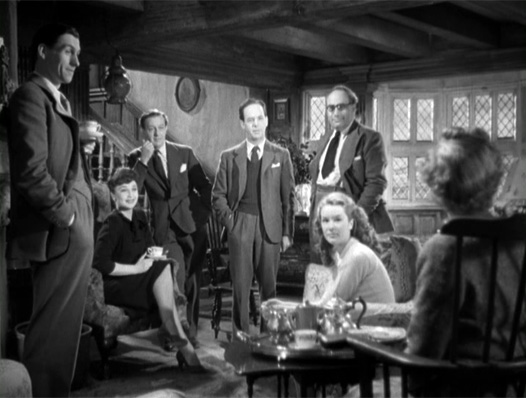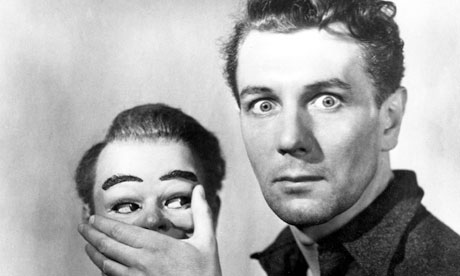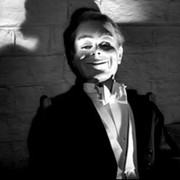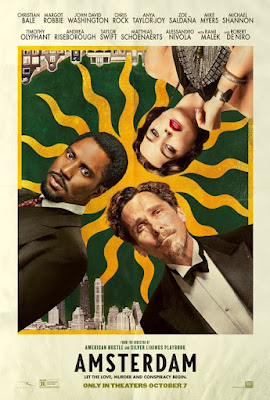While not as frequent as they once were, horror anthologies continue to be made, "V/H/S" from last year being an example (and a film I have yet to see myself). All horror anthologies probably have "Dead of Night" to thank for creating a format and softening up audiences for a mixture of styles in telling the stories. This 1945 film had four different directors and a big variety of screen writers (including H.G. Wells who contributed the story that the humorous segment was based on). Each of the segments is told in a different style but all of them have a element of the supernatural to tie them together.


 short but chilling story of forewarning that prevented him from being
in a second deadly accident. The image of a horse drawn hearse appears
to him and an avuncular driver smiles in a slightly friendly but also
creepy manner and tells him, "There's room for one more". If you are a
fan of the "Final Destination" series, you know that death is always
knocking at the door and that it can't be cheated for long. This story
takes that as a premise sixty years before that series of films began.
Tony Todd nods and winks in the first "Final Destination" film in almost
exactly the same menacing way that the driver does in this movie, that
is not a coincidence. "I'll see you later" is an echo heard sixty five
years later.
short but chilling story of forewarning that prevented him from being
in a second deadly accident. The image of a horse drawn hearse appears
to him and an avuncular driver smiles in a slightly friendly but also
creepy manner and tells him, "There's room for one more". If you are a
fan of the "Final Destination" series, you know that death is always
knocking at the door and that it can't be cheated for long. This story
takes that as a premise sixty years before that series of films began.
Tony Todd nods and winks in the first "Final Destination" film in almost
exactly the same menacing way that the driver does in this movie, that
is not a coincidence. "I'll see you later" is an echo heard sixty five
years later.The transition segments back at the country house are not always smooth or closely tied to the stories that the guests share. That awkwardness is rarely noticeable because "Dead of Night" is paced so quickly in the transition scenes that we are moved to the following story almost immediately. This film is indirectly a haunted house film and the second story makes that connection a little stronger. The youngest visitor at the house is a teenage girl. She confronts the psychologist with her own unexplained
 experience. A couple of times in my own blog, I have mentioned how
ghost children seem to be a touchstone for horror films. This movie has
such a story. It is not as immediately scary as the twins in "The
Shining" but it has the benefit of being based on an actual murder. The
resolution of the original case is said to have inspired detective
fiction beginning with Sherlock Holmes. This segment also takes place at
a Christmas party so if you are ever looking for another film to fit
your annual Christmas list of movies, you can cheat a bit and throw this
one in as a choice.
experience. A couple of times in my own blog, I have mentioned how
ghost children seem to be a touchstone for horror films. This movie has
such a story. It is not as immediately scary as the twins in "The
Shining" but it has the benefit of being based on an actual murder. The
resolution of the original case is said to have inspired detective
fiction beginning with Sherlock Holmes. This segment also takes place at
a Christmas party so if you are ever looking for another film to fit
your annual Christmas list of movies, you can cheat a bit and throw this
one in as a choice.Haunted mirrors are the subject of the most intense story in the film. Horror stories are filled with examples of people seeing something in a mirror that is not there when they turn around. Mirrors are also used to give contemporary films a "boo" moment so often that it has become a cliche. In the segment here, we don't get that kind of a scare, instead we are treated to an
 early kind of a possession story. It is the easiest one for the doctor
to explain away with his theories of how the mind works. The bit here is
a melodramatic interlude and it builds the tension of the movie up
pretty well. Modern audiences will see what is coming but if you look at
it from the perspective of an audience in 1945, it will be a bit more
of a surprise.
early kind of a possession story. It is the easiest one for the doctor
to explain away with his theories of how the mind works. The bit here is
a melodramatic interlude and it builds the tension of the movie up
pretty well. Modern audiences will see what is coming but if you look at
it from the perspective of an audience in 1945, it will be a bit more
of a surprise.In the 1983 "Twilight Zone Movie", Joe Dante's segment had a supernatural twist but it was largely played for laughs. That was the case in 1945 as well with a salacious ghost story involving golf. Two best friends who have devoted their lives to golf, suddenly fall for the same woman. Between the three of them, they agree to a match that will resolve the dilemma as to who gets the girl. When the loser drowns himself in the water hazard at their club everything seems to be resolved. Of course that is not the case. The ghost of the best friend arrives in time to haunt the upcoming wedding and honeymoon. By divine rule he must be no more than six feet from the man he is haunting and that will make the bridal suite a little uncomfortable. This section is filled with British "good show" and sportsmanship until the issue of cheating comes up. If you don't think a golfer's devotion to the sport can
 be
funny or that a woman should be treated like a tournament prize, then
this segment may not appeal to you. This was the segment that H.G. Wells
contributed. It has the least consistently eery atmosphere of all
sections of the film. In fact, this segment was excised from the
original American release of the movie because it was so different from
the rest of the movie. I suspect it was placed in the original spot in
the film to give the audience a bit of a break before launching into the
darkness of the stories that finish off the movie.
be
funny or that a woman should be treated like a tournament prize, then
this segment may not appeal to you. This was the segment that H.G. Wells
contributed. It has the least consistently eery atmosphere of all
sections of the film. In fact, this segment was excised from the
original American release of the movie because it was so different from
the rest of the movie. I suspect it was placed in the original spot in
the film to give the audience a bit of a break before launching into the
darkness of the stories that finish off the movie.The psychologist now shares his own story, one that comes close to making him accept that supernatural events can occur. The most famous segment of the film is the multiple personality thriller featuring Michael Redgrave. He plays Max Frere, the sensational ventriloquist entertaining in a posh Parisian nightclub. An American with the same vocation tracks him down to watch his act and discovers that the dummy in the act is the one wearing Frere's face. The idea of a ventriloquist losing himself in his art is so effective that it served as the basis of not just one but two Twilight Zone episodes. Another Shakespearean
Classic horror from the past often relies on mood rather than shock. It was rare that any blood got spilled. That is not the case in subsequent anthologies. "The House That Dripped Blood", "Creepshow", "Tales From The Darkside" and others have put more than their fair share of crimson on the screen. They all follow a tradition however, that frightened our grandparents and great grandparents with hardly anything more than an idea. The final "tie up" of the story, is most horrifying because of it's apparent inevitability. Every opportunity to break out of the "stranglehold" of the story is defeated by a piece of logic that we ultimately see was a mistake. When the denouncement arrives it might seem like old hat to modern audiences but it was as fresh in 1945 as "Memento" was in 2000. If a modern audience can have the patience required and recognize that acting styles that are older are not automatically invalid, then you are likely to enjoy adding "Dead of Night" to the list of films you saw before you died.

Richard Kirkham is a lifelong movie enthusiast from Southern California and now Texas. While embracing all genres of film making, he is especially moved to write about and share his memories of movies from his formative years, the glorious 1970s. His personal blog, featuring current film reviews as well as his Summers of the 1970s movie project, can be found at Kirkham A Movie A D






